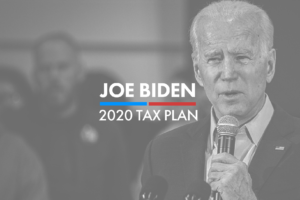If Biden wins the presidential election, taxes will go up considerably for many Americans. That doesn’t look good for an already ailing economy.
October 19, 2020
By: Bobby Casey, Managing Director GWP

It’s difficult to say what the odds are of a Biden-Harris ticket winning this election. You ask some, they are leading in the polls by significant and large margins. You ask others, not so much.
One thing is for sure: Biden will raise taxes. Of that there is no doubt. Realizing that there are more people making less than $400,000 than there are making more than that, his populist appeal to stick it to high income wage earners is appealing to those who would sell them out for some economic relief.
It’s a bit predatory to determine many middle class jobs “non-essential” and then swoop in with an economic relief plan to be paid by those deemed essential, but that’s neither here nor there.
Joe Biden insists that he is only going after the wealthy and those making over $400,000. That isn’t quite how it will play out, however. While that’s what he will try to implement, the unintended consequences are myriad.
The thing is: most of these consequences are 100% predictable now, without the implementation of a new tax regime.
-
Raising Capital Gains Taxes: He intends to raise capital gains to the same rate as wage income for those making more than $1 million. That could mean going from a 23.8% rate currently to a 43.4% rate. He would go on to tax unrealized capital gains at death.
-
Raising Corporate Taxes: You had to know this was coming. What sort of Democrat would he be if he didn’t take aim at the center mass of the “evil corporations”? This affects a few things.
First, he would take the corporate tax rate from 21% to 28%. Second, he would impose greater taxes on offshore corporate earnings. Third, he is looking to impose a minimum 15% tax on corporate earnings so businesses like Amazon don’t go without paying any federal income taxes as they did in 2018.
He also gets into picking winners and losers with his tax vision. On the one hand he wants to do away with tax credits realized by real estate, pharmaceutical, and fossil fuel companies; but on the other he wants to create tax incentives to bring manufacturing back to the US.
-
Raising taxes on those making over $400,000: These are some tough lines within which to color. First off, that’s damn near impossible with the corporate tax regime he’s suggesting. Anyone with shares in these corporations or pension plans would feel the hit from the corporate taxes imposed on the very corporations they own shares in. They would also feel it in their wages and overall compensation packages.
But once you make over $400,000 here’s the list of tax hikes you have to look forward to depending on how far over that line you are:
– Return to 39.6% as the top individual marginal tax rate (up from 35%), this does not include the 0.9% Medicare surtax which is part of the Affordable Care Act (ACA).
– Return the Pease deduction limitation. According to the Wall Street Journal, that would add another 1.2% to the marginal tax rate.
– Extend the Social Security payroll tax to income over $400,000. It is currently capped at $137,700, but set to increase on January 1st, 2021 to $142,800. This effectually puts the top marginal tax rate at roughly 57% including the 3.8% in Medicare taxes.
– People who earn more than $400,000 with tax rates higher than 28% would have limited itemized deductions.
– The qualified business income deduction for taxable income exceeding $400,000 would be phased out.
This doesn’t include his end to the 401(k) savings plan either:
One of the items in that document and on the Biden campaign website is a promise to “equalize the network of retirement saving tax breaks” — a proposal that generally translates to eliminating the tax advantages currently enjoyed by retirement savings accounts and replacing them with a “credit” or “match.” The idea is that the tax advantages, or “tax expenditures,” as they’re called, disproportionately accrue to relatively higher earners, and the hope of a change is to provide benefits in equal measure to all income groups.
Of course this is in the name of closing the wealth gaps. I like how closing gaps always involved taxing rich people more, not taxing the middle class less.
We addressed the scam in the 529 Savings Plan a while ago; but the moral of the story is: never trust a savings plan named after an IRS tax code.
The gains the Biden camp thinks they are going to get and what that will net out to be after everyone optimizes their tax planning to avoid these hits are two wildly different things. According to the Tax Foundation’s projections, Biden’s tax plan would lead to:
-
$2.65 trillion in additional tax revenues
-
Reduce GDP by 1.47% in the long term
The thing is, it doesn’t matter that rich people can or can’t afford to pay more in taxes. The reality is, the economy — especially as it stands right now — cannot afford to tax anyone more. These things are not being discussed because people are too busy being offended by thirty-second sound-bites.
Special Side Note: I would like to also remind my readers about this article we put out back in April 2019: “Limited Time Opportunity to Max Out Offshore Trusts“. If Biden wins, these gates are likely to close.
Click here to schedule a consultation on how you can protect your assets from overreaching governments, or here to become a member of our Insider program where you are eligible for free consultations, deep discounts on corporate and trust services, plus a wealth of information on internationalizing your business, wealth and life.

